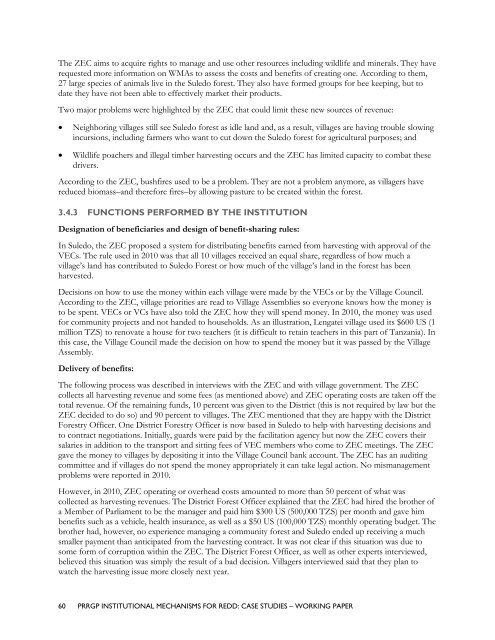Institutional Mechanisms for REDD+ - Case Studies Working Paper
Institutional Mechanisms for REDD+ - Case Studies Working Paper
Institutional Mechanisms for REDD+ - Case Studies Working Paper
You also want an ePaper? Increase the reach of your titles
YUMPU automatically turns print PDFs into web optimized ePapers that Google loves.
The ZEC aims to acquire rights to manage and use other resources including wildlife and minerals. They have<br />
requested more in<strong>for</strong>mation on WMAs to assess the costs and benefits of creating one. According to them,<br />
27 large species of animals live in the Suledo <strong>for</strong>est. They also have <strong>for</strong>med groups <strong>for</strong> bee keeping, but to<br />
date they have not been able to effectively market their products.<br />
Two major problems were highlighted by the ZEC that could limit these new sources of revenue:<br />
� Neighboring villages still see Suledo <strong>for</strong>est as idle land and, as a result, villages are having trouble slowing<br />
incursions, including farmers who want to cut down the Suledo <strong>for</strong>est <strong>for</strong> agricultural purposes; and<br />
� Wildlife poachers and illegal timber harvesting occurs and the ZEC has limited capacity to combat these<br />
drivers.<br />
According to the ZEC, bushfires used to be a problem. They are not a problem anymore, as villagers have<br />
reduced biomass–and there<strong>for</strong>e fires–by allowing pasture to be created within the <strong>for</strong>est.<br />
3.4.3 FUNCTIONS PERFORMED BY THE INSTITUTION<br />
Designation of beneficiaries and design of benefit-sharing rules:<br />
In Suledo, the ZEC proposed a system <strong>for</strong> distributing benefits earned from harvesting with approval of the<br />
VECs. The rule used in 2010 was that all 10 villages received an equal share, regardless of how much a<br />
village‘s land has contributed to Suledo Forest or how much of the village‘s land in the <strong>for</strong>est has been<br />
harvested.<br />
Decisions on how to use the money within each village were made by the VECs or by the Village Council.<br />
According to the ZEC, village priorities are read to Village Assemblies so everyone knows how the money is<br />
to be spent. VECs or VCs have also told the ZEC how they will spend money. In 2010, the money was used<br />
<strong>for</strong> community projects and not handed to households. As an illustration, Lengatei village used its $600 US (1<br />
million TZS) to renovate a house <strong>for</strong> two teachers (it is difficult to retain teachers in this part of Tanzania). In<br />
this case, the Village Council made the decision on how to spend the money but it was passed by the Village<br />
Assembly.<br />
Delivery of benefits:<br />
The following process was described in interviews with the ZEC and with village government. The ZEC<br />
collects all harvesting revenue and some fees (as mentioned above) and ZEC operating costs are taken off the<br />
total revenue. Of the remaining funds, 10 percent was given to the District (this is not required by law but the<br />
ZEC decided to do so) and 90 percent to villages. The ZEC mentioned that they are happy with the District<br />
Forestry Officer. One District Forestry Officer is now based in Suledo to help with harvesting decisions and<br />
to contract negotiations. Initially, guards were paid by the facilitation agency but now the ZEC covers their<br />
salaries in addition to the transport and sitting fees of VEC members who come to ZEC meetings. The ZEC<br />
gave the money to villages by depositing it into the Village Council bank account. The ZEC has an auditing<br />
committee and if villages do not spend the money appropriately it can take legal action. No mismanagement<br />
problems were reported in 2010.<br />
However, in 2010, ZEC operating or overhead costs amounted to more than 50 percent of what was<br />
collected as harvesting revenues. The District Forest Officer explained that the ZEC had hired the brother of<br />
a Member of Parliament to be the manager and paid him $300 US (500,000 TZS) per month and gave him<br />
benefits such as a vehicle, health insurance, as well as a $50 US (100,000 TZS) monthly operating budget. The<br />
brother had, however, no experience managing a community <strong>for</strong>est and Suledo ended up receiving a much<br />
smaller payment than anticipated from the harvesting contract. It was not clear if this situation was due to<br />
some <strong>for</strong>m of corruption within the ZEC. The District Forest Officer, as well as other experts interviewed,<br />
believed this situation was simply the result of a bad decision. Villagers interviewed said that they plan to<br />
watch the harvesting issue more closely next year.<br />
60 PRRGP INSTITUTIONAL MECHANISMS FOR REDD: CASE STUDIES – WORKING PAPER

















